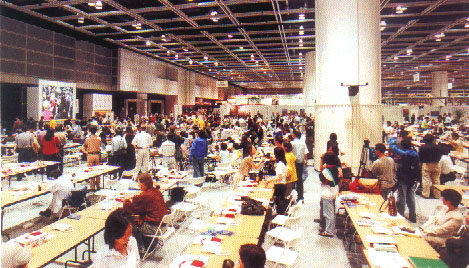
DATELINE: HONG KONG

Official Press Room, Hong Kong handover 1997.
Handover agreement : Joint Liason
Group
This document empowers the Hong Kong Government to delegate staff from the Government Information Service (GIS) to handle media arrangements for the handover.
Alan Castro, 71, is a columnist and former Editor In Chief of the Hong Kong Standard newspaper. A former foreign correspondent, he was a founding member of the pro-Beijing Hong Kong Journalists Federation.
The Hong Kong public overwhelmingly wanted a media which espoused Western press values; which would report objectively, be a watchdog of government, analyse complex issues and speak for the public. The text is an edited summary of the findings presented on 4.8.95 by Chung Ting-yiu and Sze Kit-yu.
Yash Ghai is Professor of Public Law at Hong Kong University and a specialist in constitutional law. In this interview, he explains the provisions of the Basic Law which are supposed to provide for freedom of speech in Hong Kong after 1997.
This text is an excerpt from a speech delivered to the American Chamber of Commerce by Tsang Tak Sing, a pro Beijing, Hong Kong editor. Mr. Tsang outlined how he believed the "one country, two systems" policy would operate when applied to the media.
Many of the more six hundred of the correspondents operating out
of the Crown colony belonged to the Hong Kong Foreign Correspondents
Club; the largest professional association of its type in the region.
Francis Moriarty, a RTHK reporter, is chair of the Club's Freedom of
the Press committe.
Articles written by dissidents are not to be published:
China's
Central Propaganda Department.
After the Chinese Communist Party's sixth plenary session in 1996, the Central Propaganda Department promulgated eight new regulations for the mainland media.
The HKFU was formed in 1996, drawing its membership from
predominately pro-mainland newspapers. It seeks to encourage
constructive dialogue with Beijing. The HKFU is in direct competition
with the more than twenty year old Hong Kong Journalists Association,
which is affiliated with the International Federation of Journalists.
Freedom of speech "ought" to continue in Hong Kong:
Governor
Patten.
Mr. Patten was speaking at the official opening of the
Commonwealth Journalists Association Triennial conference being held
in Hong Kong.This test is an edited version of his speech delivered
on 27.1.97.
Shaking off the British colonial yoke: Tsang
Tak-sing
This speech about freedom of speech in post colonial Hong Kong is
important because it has been given by a senior pro-Beijjing
journalist and can be expected to reflect Communist Party thinking.
Tsang Tak-sing is Editor in Chief of the pro-Beijing newspaper, Ta
Kung Pao. Mr. Tsang who is a member of the mainland's People's
Congress, has been active member of the Communist Party since he was
a teenager. He was invited to speak at the Commonwealth Journalist's
association conference to provide the Chinese government position.
They are right when they say that we [Western
journalists] are shooting sugar coated bullets!: Dr.
Johnathan Mirsky, the
Hong Kong correspondent for the London Times.
This text is an excerpt from a paper delivered by Dr. Mirsky to the Commonwealth Journalists Association meeting in Hong Kong. It indicates the level of surveillance imposed on foreign correspondents in China and suggests that Beijing was already imposing restrictions on journalists covering Hong Kong Affairs.
John David, who has now retired in London, was a journalism trainer for twenty five years, specialising in Third World countries. He first went China in 1979, acting for the Thompson Foundation, to help establish an English language newspaper, China Daily, which would be "attractive and interesting" for Western visitors. Within a year, Xinhua the government newsagency which is also a Chinese government ministry sought similar assistance.
Sandra Burton covered the Tiananmen Square demonstrations and the subsequent deaths and imprisonment of Chinese dissidents. She dealt with Chinese spokesmen who doggedly articulated the Communist Party line and who vehemently denied even those deaths witnessed by Western journalists.
Mr Verghese told the Commonwealth Journalists Association conference in Hong Kong that freedom of the press was the father and mother of all freedoms. One should not believe that it was merely the preserve of middle class intellectuals, he said.
Steve Vines is a former editor of the Eastern Express and is Hong Kong Correspondent for the British Independent News paper. He believes that press freedom have already been compromised by media owners with business interests in China.